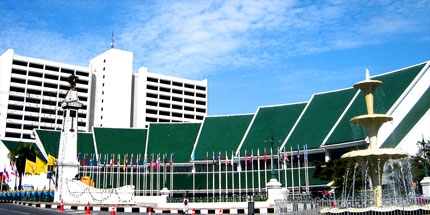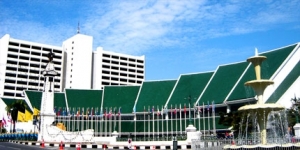Regional UN Meeting Calls for Nature-Based Solutions to Tackle Growing Environmental Challenges
PRESS RELEASE
Countries in Asia and the Pacific have been urged to transition towards a more circular economy, where materials are reused, re-manufactured or recycled, and take more innovative actions to address some of the most pressing environmental challenges faced in the region.
Organized by the United Nations Economic and Social Commission for Asia and Pacific (ESCAP) from 21 to 23 November, the fifth session of the Committee on Environment and Development drew attention to major environmental trends in the region including the unsustainable use of natural resources, dwindling ecosystem services, increasing pollution and waste, and the effects of climate change.
The Asia-Pacific region is the most resource intensive region in the world. Last year, the region accounted for 65 per cent of global domestic material consumption. Rapid urbanization, expansion of manufacturing and the consumption of an emerging middle class has led to an increase in material demand.
In her opening remarks, United Nations Under-Secretary-General and Executive Secretary of ESCAP Ms. Armida Alisjahbana underscored the importance of reaching a common understanding on the inter-related nature of environmental challenges faced across the region and establishing how overcoming them through innovative actions could help sustain economic growth and improve social development. “It is critical, because our best efforts to achieve the 2030 Agenda for Sustainable Development are falling short in Asia and the Pacific. Environmental stewardship remains inadequate,” she said.
“The difference environmental solutions could make is real. ESCAP analysis indicates incremental improvements in resource efficiency of just 1 per cent in Asia and the Pacific could generate some US$275 billion worth of savings – equivalent to half of all Foreign Direct Investment (FDI) attracted to the region. A circular economy could generate material cost savings of US$420 billion by 2025 and contribute to reducing emissions by half that required by the Paris Agreement,” added Ms. Alisjahbana.
“Make no mistake, this is a time in human history when we must take decisive action to protect the environment and our ocean. It is our children and grandchildren who will suffer the consequences,” urged Mr. Peter Thomson, Special Envoy of the UN Secretary General for the Ocean, adding “We are in a sprint, not a marathon, when it comes to achieving targets under SDG14 (Life Below Water) as the year 2020 is just around the corner.”
The Committee also recognized that regional cooperation can give scale to individual country efforts to increase resource efficiency, more effective management of ecosystems and concerted climate action.
“The region has many successful sustainable development models and shares similar challenges. Strengthening regional cooperation could lead to environmentally-friendly growth within the region,” said Mr. Wijarn Simachaya, Permanent Secretary, Ministry of Natural Resources and Environment, Thailand.
Several environmental-themed events were also held at the UN Conference Centre on the sidelines of the Committee meeting including the inaugural Asia-Pacific Day for the Ocean, launch of the regional IPBES assessment of biodiversity and ecosystem services, and the Asia Environmental Enforcement Awards 2018.
Source: United Nations ESCAP












